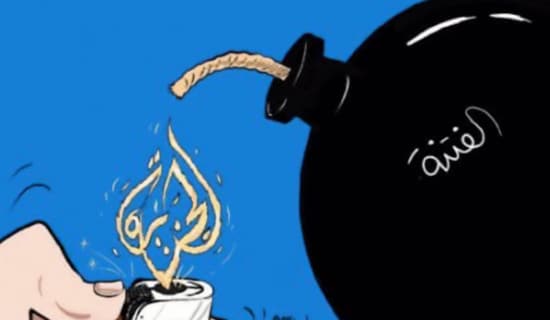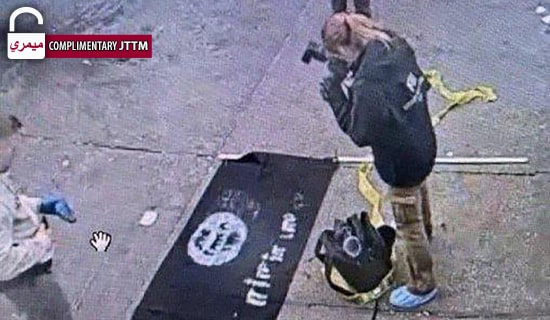The Iranian website Irdiplomacy.ir published an article, titled "Baghdad Hastily Moves Closer To Ankara; Iraq, Another Azerbaijan for Turkey!" According to Irdiplomacy.ir, Turkey has the capacity to meet the commodity needs of Iraq, by providing technical engineering assistance and partnering in Iraqi investment projects. Turkey's help to Baghdad will move Iraq's public opinion toward Turkey, thus creating a chasm between Iran and Iraq.
Irdiplomacy.ir argued that Iraq is another Azerbaijan for Turkey. "Based on what has been mentioned above, it is not unlikely that, at a faster pace, Turkey will have influence in this country [Iraq] by providing the basic necessities to its people, thereby making Iraq a participant with it [Turkey]," Irdiplomacy.ir concluded.
On December 17, 2020, Turkish President Recep Tayyip Erdoğan and Iraqi Prime Minister Mustafa Al-Kadhimi met in Ankara. During the joint press conference, President Erdoğan said that Turkey and Iraq have agreed to continue fighting against their "common enemies," namely the PKK, ISIS, and the Gülen movement. During the press conference it was also highlighting that Turkey and Iraq can easily achieve the $20 billion trade volume target.[1]
Lately, tension in Iran's relations with Turkey was given public expression in the Iranian media. The Iranian regime is alarmed by the expansionist ambitions of Erdoğan's Sunni Islamist government, which come at the expense of Shi'ite Islamist Iran and its resistance axis.[2]
Following is Irdiplomacy.ir's article:[3]

Turkish President Recep Tayyip Erdoğan and Iraqi Prime Minister Mustafa al-Kadhimi of Iraq held a joint press conference following their meeting at the Presidential Complex (source: Tccb.gov.tr, December 17, 2020).
Turkey's Support For Iraq May Create A Chasm Between Iran And Iraq
"Turkey, in view of its various structural and manufacturing capabilities and its competitive advantage, can do to Iranian exports what it did to the Middle East. If Saudi Arabia can provide financial assistance for infrastructure projects and stadiums, and donate hospitals and influence Iraqi public opinion, then Turkey has the capacity to meet the commodity needs, provide technical engineering assistance, and partner in their [Iraqi] investment projects, in accordance with European standards. Surely, these acts may further the dream of moving Iraq's public opinion toward Turkey, thus creating a chasm between Iran and them [Iraq].
"Lately, an important event took place in the relationship between Turkey and Iraq, which went unnoticed because of the 'Aras' poem incident in Azerbaijan,[4] when in fact it was very important and in the same vein with that recitation.
"Mustafa Al-Kadhimi, the prime minister of Iraq, headed a high-level delegation to Ankara and Erdoğan greeted him with the all the pomp and circumstance befitting a head of state. Trade and security agreements were executed and all the issues that related to the common strategies of the two countries were discussed in the joint news conference.
"Erdoğan [said]: 'Turkey places great respect to the total territorial integrity of Iraq and is ready to offer any assistance in the reconstruction of this country [Iraq]... We consider all of Iraq, regardless of ethnicity or religion, as our brothers and the possibility of increasing bilateral trade between the two countries to 20 billion dollars is achievable... By repairing the pipeline damaged by ISIS, we wish to increase the volume of the Kirkuk oil that is injected into the world markets... The water issue should be grounds for cooperation between the two countries and not basis for contention and conflict.'
"Al-Kadhimi [said]: 'Turkish companies play a major role in investments in Iraq and we will not permit any actions against Turkey from within Iraqi soil... We wish to increase our partnership with Turkey and have signed agreements with Ankara' (ISNA, December 22, 2020).
"Under present and past leadership, besides acting in some unacceptable manner such as the bloody suppression of the Kurds, from the point of view of securing their national interests and increasing their sphere of influence in the region, Turkey has, without engaging in any warfare, on the whole done very well. If Turkey can overcome its Ataturkism ideology and extreme nationalism, it may be able to resolve the Kurdish demands in a democratic manner. It is not far-fetched that it may become a very successful role model in both the Islamic and the non-Islamic world.
"In the Nagorno-Karabakh conflict, in coordination with Russia, it forced Armenia to surrender and brought the Republic of Azerbaijan even more than before within its sphere of influence. Now it is Iraq's turn. It gives concessions on the waters of the Tigris and the Euphrates and gets three major concessions in return:
"1. Political and economic influence in Iraq
"2. Guiding Iraq to control its own borders
"3. Reducing Iran's influence in Iraq
"From then on, Iraq's market, which until Donald Trump withdrew from JCPOA was mostly under the control of Iran and it even made possible the circumvention of some of the sanctions on Iran, is moving at a greater speed away from Iran and at the disposal of [Iran's] two regional competitors, Saudi Arabia and Turkey, who will take control."
Turkey Achieves Its National Interests By Relying On The Strength Of The Various Components Of Its National Powers
"In March of 2019, in an article entitled 'Iraq's Slow Movement Toward Saudi's Front and its Outlook on the Relationship of Qatar and Syria with Saudi Arabia,' I indicated that Iraq's policies are slowly inching away from Iran.
"Turkey, in view of its various structural and manufacturing capabilities and its competitive advantage, can do to Iranian exports what it did to the Middle East. If Saudi Arabia can provide financial assistance to infrastructure projects, stadiums and donate hospitals and influence Iraqi public opinions, then Turkey has the capacity to meet the commodity needs, provide technical engineering assistance and partner in their [Iraqi] investment projects, in accordance with European standards. Surely, these acts may further the dream of moving Iraq's public opinion towards Turkey, thus creating a chasm between Iran and them [Iraq].
"This country [Turkey], despite criticism inflicted on its actions, to some extent has a good understanding of its power and national security. To the extent possible, it avoids being entrapped in a one-on-one military confrontation. When it downed a Russian warplane, it made an official apology and prevented the escalation of the situation to a one-on-one conflict. It prods Israel, but does not go far enough to disrupt their diplomatic relationship. It challenges the U.S. on various matters and it threatens, but when necessary it softens its stance. It is in conflict in every regional front, but does not create direct conflict. It achieves its national interests by relying on the strength of the various components of its national powers (economic, diplomatic, and military).
"The AKP is an example of political parties that represent political Islamism. But contrary to the founders' tenets which were based on various religious biases, the AKP acts in a contrary manner since it does not have a full grasp of the situation and the ability to establish a better communications with differing groups as it lacks the necessary religious understanding. The only problem with the AKP and with Erdoğan and the inherited influence of Ataturkism is not being able to correctly deal with the Kurds, which stems from the failure to link the national security interests with the anti-Kurdish sentiments and not due to religious differences.
"Can one view Iraq as another Azerbaijan? Based on what has been mentioned above, it is not unlikely that, at a faster pace, Turkey will have influence in this country [Iraq] by providing the basic necessities to its people, thereby making Iraq a participant with it [Turkey]."
[1] Tccb.gov.tr/en/news/542/123262/-there-is-no-place-for-separatist-terrorism-in-the-future-of-turkey-iraq-and-syria-, December 17, 2020.
[2] See MEMRI Special Dispatch No. 9111, Iranian Expert Sadeq Maleki: 'The Old Ottomanism Was Looking To Expand To The Gates Of Vienna And To The West, [Erdoğan's] Neo-Ottomanism Has Its View Toward The East, December 29, 2020; Special Dispatch No. 9065, Anti-Turkish Statements In Iran – Part I: Iranian Daily: Erdogan Is Pursuing A Policy Of Religious, Ideological War, Hiding His Hostile Regional Policy Behind An Islamic Mask, December 2, 2020; MEMRI Special Dispatch No. 9078, Anti-Turkish Statements In Iran – Part II: Iranian Daily On 'Sultan Recep [Tayyip Erdogan],' Who 'Fantasizes That He Is The Equal Of The Ottoman Sultans And Can Tell The World What To Do,' December 9, 2020; MEMRI Special Dispatch No. 9099, Russian Expert Mirzayan: Erdogan Is Trying To Exploit Azerbaijani Nationalism To Undermine Iran, December 21, 2020.
[3] Irdiplomacy.ir, December 28, 2020; The article was written by Ali Deyni Turkmani.
[4] See MEMRI Special Dispatch No. 9105, IRGC-Affiliated Javan Daily: Erdoğan 'Is In Pursuit Of Creating His Delusional State,' His 'Imaginary New Ottoman Empire,' December 23, 2020; MEMRI TV clip No. 8530, Turkish President Recep Tayyip Erdoğan In A Parade In Baku, Azerbaijan: We Are Two States, But One Nation; We Must Hold Accountable Those Who Violated The Honor Of Humanity In The Nagorno-Karabakh War, December 10, 2020.




